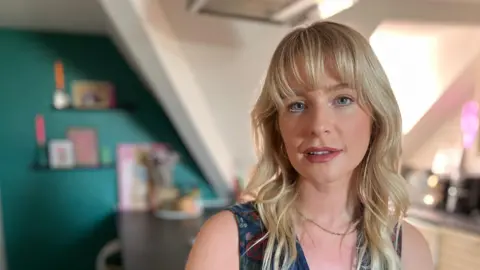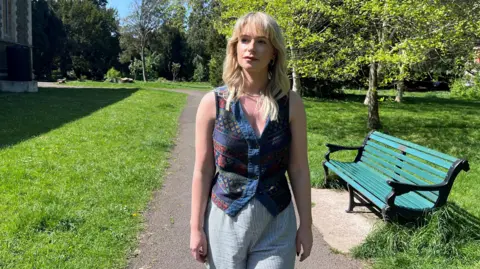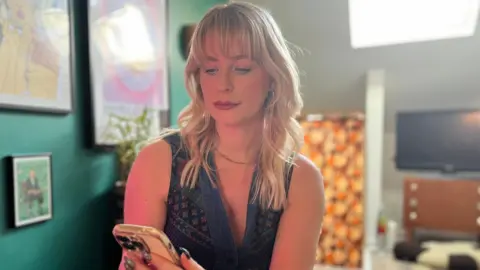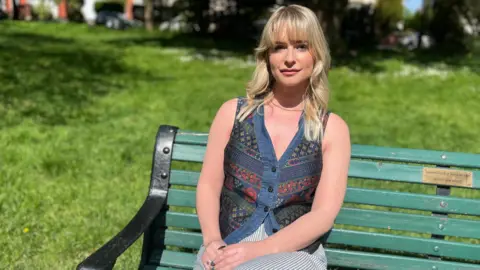Presenter whose intimate pics were leaked fights back
 BBC
BBCTV presenter Jess Davies was just 15 years old when images of her in her underwear were shared around her town.
She had exchanged photos with a boy she fancied, and he had forwarded them on to others without her consent.
She was in art class when her phone started buzzing with messages from older boys.
"Nice pictures," read one. "I didn't think you were that type of girl," came another.
"It turns out my images had been Bluetoothed around the whole sixth form centre, which quickly got shared around my school, then around my hometown and eventually ended up on the phones of the men's football team in the town," said Jess.
Warning: Contains sexually explicit language and themes

"It's a small town so people knew who I was and knew I was underage and yet still flashed my images around to people that were in their 20s or 30s," Jess said.
Eventually news of the images reached her grandmother who told her parents.
This was to be the first of several incidents Jess experienced in her teens and 20s that would later inform her women's rights campaigning.
Her 2022 BBC documentary Deepfake Porn: Could You Be Next? was used to lobby the UK government to criminalise sexually explicit deepfakes in the Online Safety Act.
Now she has written a book, No One Wants To See Your D*ck: A Handbook for Survival in the Digital World, for which she has had to explore everything from sexual harassment to cyber-flashing and catfishing, and tells of men on well-known, easy-to-access forums requesting explicit deepfakes of their mothers and teachers.
Others are uploading explicit photos of women they know and asking other men to write rape fantasies about them, Jess said.
"These aren't some weirdos in their mum's basement who are chronically online, never leave their homes and don't have a social life, no, these are people's friends and people's husbands," said Jess, who lives in Penarth, Vale of Glamorgan.
"There's a generation that's growing up online and it's a generation who don't see women as whole humans who have rights.
"It's a pandemic of misogyny that is unfolding online and isn't being taken seriously."

Jess, who grew up in the seaside town Aberystwyth in Ceredigion, said she had dealt with unwanted male attention since she was a child.
"I developed my body when I was really young and started wearing a bra when I was in year four so by the time I was in year six I would get comments from grown adult men about me being jailbait," she said.
"It's never really spoken about how girls who develop early are just treated so differently, all of a sudden it's like you're seen as 'you're mature now'."
When her photos were leaked at 15 her parents were supportive but Jess said she got her first taste of victim-blaming from others around her.
"So much shame is put on the victim. It's like, 'why did you take that? Why did you share that?' I'm like, 'why did someone share that without my consent? And why are grown adult men passing it around?'."
Three years later Jess was a glamour model.
She said it was an attempt to "reclaim a bit of power back".
"You've all seen my images, you all have this idea of me, so why not make some money out of this and make a career out of it?" she explained.
When she started out modelling she decided she was only going to do lingerie and swimwear shoots - but she said this was also taken out of her control.
She said she agreed to pose in a mesh swimsuit on the agreement her nipples would be edited out.
A couple of months later a man messaged her on social media to complement her on the images. She searched for them online and discovered the agreement had been broken and her nipples were on show.
"From then on it just kind of spiralled really," she said.
"You're trying to grapple with holding on to some kind of power and holding on to some kind of boundaries but other people keep taking them from you."

Jess said before she was even 20 she had "just kind of accepted that this is just how it is".
But then she was let down by someone she had hoped she could trust.
"I really liked this guy," she recalled.
"He'd made a few comments about telling his friends that I was 'Jess from Nuts magazine' and you think 'okay, you see me through that lens', but you brush it off because you like them."
One morning after staying over at his she woke with a weird sense that something was not right.
While he was in the shower she decided to check his phone.
"It opened on to a group chat and there was an image of me totally naked in his bed and asleep - he'd sent that in the group chat," she said.
"He had a single bed, so I was like, 'you would have had to stand up to take that, it's such a conscious decision'."
She quickly deleted the image from his phone, knowing those who had received it may have already saved it and forwarded it on.
What do you say to someone who has done that to you?
"When he came back I still didn't say anything because I was just so ashamed and embarrassed, I didn't like confrontation and I didn't want to argue," said Jess.
Adolescence and the manosphere
It was while studying sociology at university that Jess made her first foray into feminism and began really questioning her experiences.
"I had this sense of anger, I just felt it wasn't fair that women were being treated this way and women losing total control over their images online," she said.
It was only once she started speaking to other women and experts in the field while making her documentary that she started to let go of the shame and blame she had carried for years.
"That was really life-changing for me," she said.
"[I realised] there was something here that we can fight for and try and change things, which is what I've been doing ever since."
Jess, 32, said one of the many reasons she wrote her book was to call out victim-blaming which she said remained "rife".
"You shouldn't have gone to that house party, you shouldn't have sent that photo, or don't wear that short skirt because you're going to get attention," she said, were remarks that only further solidified sexist attitudes and removed the blame from the perpetrator.
She said she was glad when Netflix's Adolescence started a conversation on the so-called manosphere but wants the conversation to go further.
"What we're missing is the teenage girls who are actually being affected by this," she said.
"We're expecting them to be able to navigate this male entitlement at a very young age, where they're being pressured to send images and being turned into explicit deep fakes.
"We're putting all our attention on giving these workshops to teenage boys and talking about saving them from being radicalised, which is important, but no-one's talking about what to do for teenage girls."
Jess wants to see more money put into educating young people about navigating digital spaces, arguing the occasional workshop was not enough to counteract the thousands of hours teens spend online potentially being exposed to misogynistic content.
Men also need to stop being so defensive and call out bad behaviour in other men, she said.
"I always get in my [social media] comments, 'not all men'. Of course, not all men - but you're just shutting down the conversation," she said.
"Instead of being defensive, actually listen to women... read books by women, listen to podcasts that are presented by women, watch documentaries that are presented by women."
She said parents also needed to be more "switched on".
"If Adolescence shocked you that's shocking to me, because that's basic, basic level stuff," she said.
"That is skimming the surface of what's happening in these spaces."
